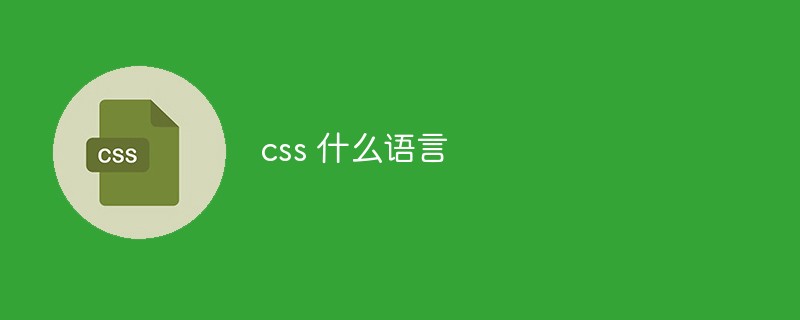
CSS is a computer language used to express file styles such as HTML or XML. It is a style design language that can truly separate web page presentation and content. CSS can not only statically modify web pages, but can also cooperate with various scripting languages to dynamically format various elements of web pages.

The operating environment of this tutorial: Windows 7 system, CSS3 version, Dell G3 computer.
What is the language of CSS?
CSS is a computer language used to express document styles such as HTML (an application of Standard Generalized Markup Language) or XML (a subset of Standard Generalized Markup Language). The latest version of CSS is CSS3, which is a style design language that can truly separate web page performance and content.
Compared with the performance of traditional HTML, CSS can perform pixel-level precise control over the position and layout of objects in web pages, supports almost all font size styles, and has the ability to edit web page objects and model styles. , and can carry out preliminary interaction design. It is currently the best performance design language based on text display.
CSS can simplify or optimize the writing method according to the understanding ability of different users. It has strong readability for all types of people.
Simply put: CSS is used to change the appearance of html tags in the browser.
CSS helps achieve responsible web design. CSS has a huge impact on how developers build Web sites, and the impact is likely to be endless. Moving most or even all of the presentation information of a web page out of (X)HTML files and keeping them in a style sheet has many advantages, such as reducing file size, saving network bandwidth, and ease of maintenance. In addition, the separation of the site's performance information and core content allows site designers to make various modifications to the entire site in a short period of time.
CSS simplifies the format code of the web page, and the external style sheet will also be saved in the cache by the browser, speeding up the download and display speed, and also reducing the amount of code that needs to be uploaded (because repeated formatting will is saved only once). As long as you modify the CSs style sheet file that saves the website format, you can change the style and characteristics of the entire site. It is particularly useful when modifying a site with a large number of pages. This avoids modification of web pages one by one and greatly reduces the workload.
Features of CSS:
1. Rich style definitions
CSS provides rich document style appearance, as well as the ability to set text and background attributes. Ability; allows you to create a border for any element, as well as the distance between the element border and other elements, as well as the distance between the element border and the element content; allows you to change the capitalization, decoration, and other page effects of text at will.
2. Easy to use and modify
CSS can define the style in the style attribute of the HTML element, or in the header part of the HTML document, or you can declare the style in a Special CSS files for reference in HTML pages. In short, CSS style sheets can store and manage all style declarations in a unified manner.
In addition, elements of the same style can be classified and defined using the same style, you can also apply a certain style to all HTML tags with the same name, or you can assign a CSS style to a certain in page elements. If we want to modify the style, we only need to find the corresponding style statement in the style list and modify it.
3. Multi-page application
CSS style sheet can be stored in a separate CSS file, so that we can use the same CSS style sheet in multiple pages. Theoretically, CSS style sheets do not belong to any page file and can be referenced in any page file. In this way, the styles of multiple pages can be unified.
4. Cascading
Simply put, cascading is to set the same style multiple times on an element, which will use the last attribute value set. For example, if you use the same set of CSS style sheets for multiple pages in a site, and if you want to use other styles for some elements in some pages, you can define a separate style sheet for these styles and apply them to the page.
5. Page compression
In websites that use HTML to define page effects, a large number or repeated tables and font elements are often required to form text styles of various specifications. The consequence of this is that Generates a large number of HTML tags, thereby increasing the page file size.
(Learning video sharing: css video tutorial)
The above is the detailed content of css what language. For more information, please follow other related articles on the PHP Chinese website!